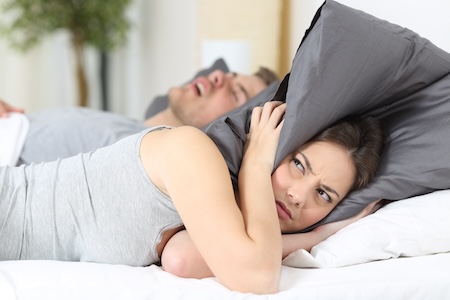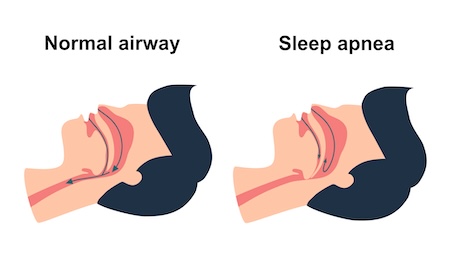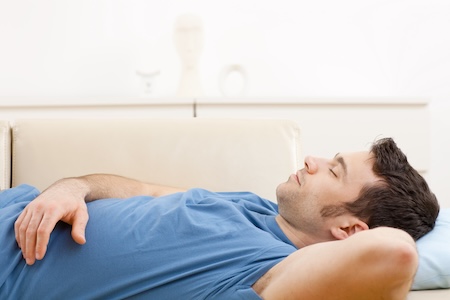Sleep Apnea Treatment at Torrey Dental
Sleep apnea is a serious sleep disorder that occurs when a person’s breathing is interrupted during sleep. People with untreated sleep apnea stop breathing repeatedly during their sleep. This means the brain—and the rest of the body—may not get enough oxygen. This can be dangerous and contribute to low-quality rest.
Learn more about sleep apnea and how it is affecting your health by scheduling a sleep apnea appointment at our office.
Request An Appointment
Signs and Symptoms
- Loud snoring
- Episodes of breathing cessation during sleep
- Abrupt awakenings accompanied by shortness of breath
- Awakening with a dry mouth or sore throat
- Morning headache
- Difficulty staying asleep (insomnia)
- Excessive daytime sleepiness (hypersomnia)
- Attention problems
- Irritability
- Frequent waking to use the bathroom
- Inability to breathe nasally
If you think you might be suffering from sleep apnea, don’t worry any longer. Schedule a sleep apnea consultation today with Dr. Torrey and get your health back on the right track!
Diagnosing Sleep Apnea

We are committed to ensuring the health and well-being of our patients, which includes the diagnosis and management of sleep apnea. We will have you perform a two-night sleep screen home test to see if you have the findings consistent with an airway problem. If your sleep screen reveals the possibility of sleep apnea, we may refer you to a medical doctor for confirmation. We will work closely with your medical doctor to help determine if a CPAP (continuous positive airway pressure) or a MAD (mandibular advancement appliance) is needed. We’ll ensure that you are receiving the best care for your clinical issue.
Our approach is to work on identifying what’s treatable in regards to a patient’s structural issues with the mouth, nose, and tongue as well as looking at contributing factors such as sleep habits, allergies, and other lifestyle choices. We seek to address the oral concerns around sleep apnea and help our patients understand the benefits of having them corrected.
Mild, Moderate, or Severe Sleep Apnea
The number of times your breathing stops per hour is the preferred method for determining the severity of your sleep disorder. A person with mild sleep apnea has 5-15 apneic events per hour, while a person with moderate sleep apnea may see between 15–30 events per hour. If you experience 30 or more events per hour, you likely have severe sleep apnea.
Our sleep study will help us determine the severity of your sleep apnea.
Common Sleep Apnea Causes
Do you snore loudly at night or wake up feeling tired even after a full night’s rest? You could have a form of sleep apnea, which is a severe sleep disorder causing frequent stops and starts in breathing. Whenever your body feels the strain caused by the excess of carbon dioxide, your brain sends signals to wake you up to resume breathing.
Sleep apnea is most common in older people and people who are overweight or obese. People with sleep apnea are more likely to develop diabetes, heart disease, hypertension, and strokes. It is critical to get a proper diagnosis and treatment as early as possible.
Types of Sleep Apnea
- Obstructive Sleep Apnea (OSA): The most common form, caused by a blockage of the airway when the soft tissue in the back of the throat collapses during sleep.
- Central Sleep Apnea: Unlike OSA, the airway is not blocked, but the brain fails to signal the muscles to breathe due to instability in the respiratory control center.
Benefits of Sleep Apnea Therapy
Oral appliance therapy may be a good treatment choice for people who prefer another type of treatment, those who can’t tolerate CPAP therapy, or for whom CPAP therapy is not effective at controlling their symptoms.
Compared to CPAP, oral appliances are known for being:
- Easier to use
- More compact and mobile
- Not reliant on electricity
- A good alternative when traveling
- Quieter and more discreet
If you have been diagnosed with obstructive sleep apnea and are looking for an alternative to your CPAP therapy or are not a candidate for CPAP, talk to our dentists about whether an oral appliance may be appropriate for you!

Our Approach To Treatment
At Torrey Dental, we understand the impact of sleep apnea on your health and quality of life. We offer customized treatment plans that may include lifestyle changes, breathing devices, and more.
Oral Appliance Therapy
One of the treatment options we provide is oral appliance therapy. These appliances are custom-fitted to help maintain an open, unobstructed airway during sleep. They are an effective treatment for many patients and can help to reduce or eliminate the symptoms of sleep apnea.
Oral appliance therapy is fit specifically to your mouth, and many report it to be much more effective than a CPAP machine.
Lifestyle Changes for Sleep Apnea
In conjunction with other treatments, lifestyle changes can help mitigate sleep apnea symptoms and improve overall health. Some lifestyle adjustments that may help alleviate sleep apnea include:
- Weight Loss: Excess weight can contribute to airway obstruction and worsen sleep apnea. Losing weight through a healthy diet and regular exercise can reduce symptoms.
- Sleep Position: Sleeping on your side rather than your back can help prevent the tongue and soft tissues from collapsing and obstructing the airway.
- Avoid Alcohol and Sedative Medications: These substances can relax throat muscles and make airway obstruction more likely.
- Practicing Good Sleep Hygiene: Establishing regular sleep patterns and creating a conducive sleep environment can help ease sleep apnea symptoms. Sleeping in a cold dark room without white noise is the optimal environment.
We will work with your primary care physician to suggest lifestyle changes that can help you return to a better night’s sleep!
Are There Any Risks to Using an Oral Appliance for Sleep Apnea?
You may experience side effects when first starting to use an oral appliance. The side effects depend on the type of oral appliance you use but can include:
- Increased saliva production
- Dry mouth
- Mild discomfort in the teeth
- Develop open or loose contacts between the teeth
- Tenderness of the jaw joint
These side effects are generally mild and will get better within a few weeks. If you are experiencing any negative side effects with your new oral appliance, reach out to our office to speak with our dentist!
Oral Appliance Therapy—A Great Alternative!
Oral appliance therapy and CPAP therapy are both effective treatment options for sleep apnea but have different advantages and considerations.
Various factors might persuade a patient to start using oral appliance therapy for their sleep apnea needs. Here are some reasons why oral appliance therapy is a great CPAP alternative:
- Comfortable: Many people find oral appliances more comfortable and easier to adapt to than CPAP machines. Oral appliances are custom-made to fit the mouth perfectly. Patients find them less intrusive and disruptive to their sleep, thus leading to improved compliancy.
- Portable: Oral appliances are similar to the size of a retainer, making them convenient for travel and easier to use.
- Reduced Side Effects: CPAP therapy can cause side effects of dry mouth, nasal congestion, skin irritation, and feelings of claustrophobia from wearing a mask.
- Non-invasive: Oral appliances are recommended as a first-line treatment for mild to moderate cases of sleep apnea. They can effectively treat these cases without the need for more invasive interventions.
Our office focuses on straightforward results and dentistry, achieved by a relationship with our patients. If you are concerned about your current sleep apnea therapy or CPAP therapy, visit Dr. Torrey to learn about alternatives.
Why Choose Torrey Dental?
Our office is here to help!
- Personalized Care: Every patient receives a treatment plan tailored to their needs.
- Expertise: Our team is trained in the latest techniques and treatments for sleep apnea.
- Convenience: Located in Pullman, WA, we are committed to making your treatment as convenient as possible.
At our practice, Dr. Marcus Torrey is certified in treating patients who are diagnosed with sleep apnea. Finding the best possible treatment is our main priority. Dr. Torrey and his team will continue to work with patients to help them find the best solution for their sleep apnea and continue to follow up on how their sleep apnea and health are progressing.
Frequently Asked Questions about Sleep Apnea
Being diagnosed with sleep apnea can seem like a scary and tricky diagnosis to navigate. Here at Torrey Dental, we are dedicated to helping our patients navigate sleep apnea and find the best treatment for them. Here are some frequently asked questions patients might have about sleep apnea and treatment.
Is sleep apnea diagnosed by a doctor or dentist?
If you suspect you might be suffering from sleep apnea, getting a sleep apnea test from a certified sleep apnea physician is important. After the official diagnosis, your doctor and dentist can tailor a strategy that is right for you and help determine treatment options and a plan moving forward.
How common is sleep apnea among American adults?
Experts suggest one out of five adults have mild sleep apnea, while one out of every 15 adults have moderate sleep apnea. Some studies suggest that there may be a hereditary link to sleep apnea, so your doctor may ask about your family history during evaluation.
What are the most common sleep apnea treatments?
Sleep apnea may not always be curable, but several sleep apnea treatments are available to make its symptoms more manageable. The most common sleep apnea treatments include:
- Weight loss
- Nasal decongestants
- Sleep apnea oral devices
- CPAP therapy
- Surgery
Can children develop sleep apnea?
Children can develop sleep apnea, although it’s far less common among children than adults. Children with larger-than-normal tonsils and adenoids are more likely to develop obstructive sleep apnea. Children with sleep apnea may develop hyperactivity issues.
How do I choose the best treatment option for my sleep apnea?
To choose the most effective treatment for your sleep apnea, consult a healthcare professional who is experienced and trained in sleep medicine. The process involves a sleep study to diagnose the severity of your sleep apnea. The sleep specialist will then recommend a treatment plan and maybe involve the dentist to try a dental oral appliance.
Is sleep apnea treatment necessary, or will symptoms improve on their own?
Untreated sleep apnea can lead to a range of health complications, including high blood pressure, heart disease, stroke, Alzheimer’s, and type 2 diabetes. Losing sleep or experiencing low-quality sleep can significantly impair daily functioning and quality of life. Therefore, it is crucial to seek appropriate treatment to manage the condition effectively and improve overall health.
Get Started
If you suspect you or a loved one has sleep apnea, contact us today to schedule a consultation. Let us help you achieve a better night’s sleep and improve your overall health.